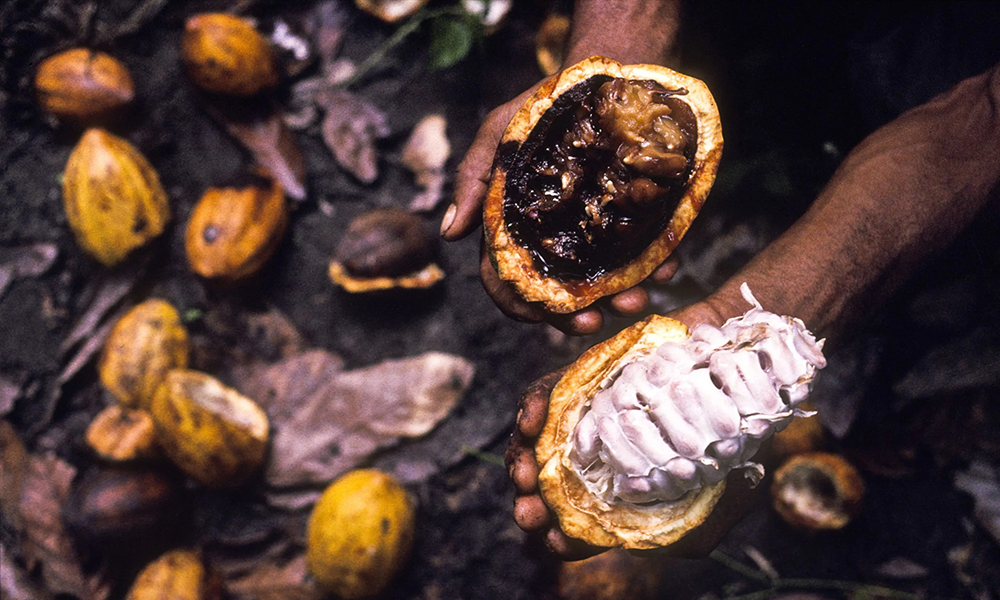
在HBO熱播劇《最后生還者》(The Last of Us)的開場,一位流行病學(xué)家告訴持懷疑態(tài)度的脫口秀觀眾,,大自然對人類最大的威脅之一不是病毒引起的大流行,,而是全球變暖導(dǎo)致的寄生真菌進(jìn)化(這一趨勢不可阻擋),將人類宿主變成了威脅社會的無腦生物,。
值得慶幸的是,,僵尸爆發(fā)這樣的假設(shè)仍然是小說題材,但科學(xué)家警告說,,盡管真菌病原體不太可能傷害人類,,但病毒的廣泛傳播仍然對我們的糧食系統(tǒng)構(gòu)成嚴(yán)重威脅。
根據(jù)5月2日發(fā)表在《自然》雜志(Nature)上的一份由糧食安全和真菌病原體專家撰寫的報(bào)告,,由于氣候變化,,世界上許多最重要的農(nóng)作物都面臨真菌感染日益盛行的風(fēng)險(xiǎn)。作者寫道,,真菌對“人類健康構(gòu)成重大威脅”,,因?yàn)檎婢l(fā)已經(jīng)導(dǎo)致農(nóng)民每年在種植時(shí)損失10%至23%的作物,收獲后又損失10%至20%,。
真菌病原體一直對農(nóng)作物構(gòu)成重大威脅,,因?yàn)樗鼈儔勖L,而且極易傳播,。但由于高緯度地區(qū)氣溫升高,,真菌爆發(fā)變得越來越頻繁,這使得通常存在于熱帶地區(qū)的真菌傳播速度比以往任何時(shí)候都要快,,就像電視劇中出現(xiàn)的那場終結(jié)世界的真菌爆發(fā)一樣,。
該報(bào)告的合著者之一、??巳卮髮W(xué)(University of Exeter)的糧食安全系主任薩拉·古爾在一份聲明里寫道:“雖然這一故事情節(jié)是科幻小說,,但我們警告,隨著全球變暖,,真菌的耐藥性增強(qiáng),,我們可能會看到一場由真菌感染在全球迅速蔓延造成的全球健康災(zāi)難?!?/p>
“迫在眉睫的威脅不是僵尸,,而是全球饑荒?!?/p>
一場“完美風(fēng)暴”
美國農(nóng)業(yè)部(U.S. Department of Agriculture)指出,,真菌感染導(dǎo)致在收割開始之前損失高達(dá)20%的作物,,代價(jià)高昂,全球每年可能損失高達(dá)2,000億美元,。據(jù)研究人員稱,,每年真菌感染造成的糧食損失相當(dāng)于滿足多達(dá)40億人日常熱量需求所需的糧食量。
報(bào)告指出,,世界上最重要的五種熱量作物是水稻,、小麥、玉米,、大豆和土豆,,它們都容易受到真菌病害的影響。僅大米,、小麥和玉米就能夠提供人體超過40%的熱量,。
真菌已經(jīng)很危險(xiǎn)了,因?yàn)樗鼈兛梢噪S風(fēng)傳播很遠(yuǎn)的距離,,并迅速吞噬大片農(nóng)作物,,但一些現(xiàn)代問題造成“完美風(fēng)暴”威脅,使危機(jī)加劇,。
該報(bào)告表示,,殺菌劑的廣泛使用正在導(dǎo)致真菌耐藥性增強(qiáng),而單一種植的日益普及促使真菌迅速吞噬單一作物,。氣候變化可能是導(dǎo)致情況惡化的最主要因素,,因?yàn)檎婢壳罢谝悦磕昙s7公里(超過4英里)的速度向兩極地區(qū)推進(jìn)。例如,,小麥稈銹病是一種通常在埃塞俄比亞等熱帶國家出現(xiàn)的病原體引起的病害,,但多年來在包括英國和斯堪的納維亞國家在內(nèi)的高緯度地區(qū)也觀察到該病原體引起的病害。
所有這些因素加起來,,都讓真菌病原體更易傳播,,并對農(nóng)作物造成嚴(yán)重破壞,在最糟糕的時(shí)候會帶來全球健康災(zāi)難威脅,。
到2050年,,世界人口將達(dá)到近100億,對糧食的需求增加,,其中大部分增長來自資源緊張的非洲國家。特別是撒哈拉以南非洲的糧食不安全狀況正在加劇,,因?yàn)闅夂蜃兓?、持續(xù)干旱和俄烏沖突破壞了該地區(qū)的糧食供應(yīng)。2020年,,非洲超過五分之一的人口面臨長期饑餓,。
“預(yù)計(jì)全球人口將飆升,,人類正面臨前所未有的糧食生產(chǎn)挑戰(zhàn)。我們已經(jīng)發(fā)現(xiàn),,真菌感染導(dǎo)致農(nóng)作物大量損失,,而損失的作物每年足以養(yǎng)活數(shù)百萬人?!痹搱?bào)告的另一位合著者,、德國基爾大學(xué)(Christian-Albrechts University of Kiel)的真菌和群體遺傳學(xué)教授伊娃·斯圖肯布洛克說。
阻止傳播
該報(bào)告呼吁研究人員提高對真菌感染危害的“認(rèn)識”,。古爾稱,,雖然《最后生還者》已經(jīng)引起了人們對真菌威脅的關(guān)注,但要避免一場重大的健康危機(jī),,可能還需要更多的關(guān)注,。
除了為研發(fā)有效的殺菌劑提供更多資金外,該報(bào)告還呼吁農(nóng)民和政府加強(qiáng)合作,,增加作物多樣性,,以減緩真菌病原體的傳播。作者還號召對抗病作物以及早期疾病檢測(通過人工智能和遙感技術(shù)實(shí)現(xiàn))進(jìn)行更多研究,。
該報(bào)告主張建立一個(gè)全球機(jī)構(gòu),,協(xié)調(diào)和指導(dǎo)保護(hù)作物免受感染的相關(guān)工作,就像各國政府和學(xué)術(shù)界在新冠疫情期間集中資金和資源研究病毒感染和預(yù)防一樣,。
就像HBO電視劇開頭虛構(gòu)的流行病學(xué)家一樣,,研究人員認(rèn)為,真菌病原體研究應(yīng)該和病毒研究一樣受到重視,,并獲得資源支持,,因?yàn)槠滹L(fēng)險(xiǎn)可能同樣較高。
古爾說:“我們看到世界各國因?yàn)樾鹿谝咔樵斐傻娜祟惤】低{而團(tuán)結(jié)起來,?!彼粲醺鲊谡婢腥痉矫婕哟笸顿Y,“阻止真菌爆發(fā)發(fā)展成一場全球?yàn)?zāi)難,,使人們陷入饑荒,。”(財(cái)富中文網(wǎng))
譯者:中慧言-王芳
在HBO熱播劇《最后生還者》(The Last of Us)的開場,,一位流行病學(xué)家告訴持懷疑態(tài)度的脫口秀觀眾,,大自然對人類最大的威脅之一不是病毒引起的大流行,而是全球變暖導(dǎo)致的寄生真菌進(jìn)化(這一趨勢不可阻擋),,將人類宿主變成了威脅社會的無腦生物,。
值得慶幸的是,僵尸爆發(fā)這樣的假設(shè)仍然是小說題材,,但科學(xué)家警告說,,盡管真菌病原體不太可能傷害人類,,但病毒的廣泛傳播仍然對我們的糧食系統(tǒng)構(gòu)成嚴(yán)重威脅。
根據(jù)5月2日發(fā)表在《自然》雜志(Nature)上的一份由糧食安全和真菌病原體專家撰寫的報(bào)告,,由于氣候變化,,世界上許多最重要的農(nóng)作物都面臨真菌感染日益盛行的風(fēng)險(xiǎn)。作者寫道,,真菌對“人類健康構(gòu)成重大威脅”,,因?yàn)檎婢l(fā)已經(jīng)導(dǎo)致農(nóng)民每年在種植時(shí)損失10%至23%的作物,收獲后又損失10%至20%,。
真菌病原體一直對農(nóng)作物構(gòu)成重大威脅,,因?yàn)樗鼈儔勖L,而且極易傳播,。但由于高緯度地區(qū)氣溫升高,,真菌爆發(fā)變得越來越頻繁,這使得通常存在于熱帶地區(qū)的真菌傳播速度比以往任何時(shí)候都要快,,就像電視劇中出現(xiàn)的那場終結(jié)世界的真菌爆發(fā)一樣,。
該報(bào)告的合著者之一、??巳卮髮W(xué)(University of Exeter)的糧食安全系主任薩拉·古爾在一份聲明里寫道:“雖然這一故事情節(jié)是科幻小說,,但我們警告,隨著全球變暖,,真菌的耐藥性增強(qiáng),,我們可能會看到一場由真菌感染在全球迅速蔓延造成的全球健康災(zāi)難?!?/p>
“迫在眉睫的威脅不是僵尸,,而是全球饑荒?!?/p>
一場“完美風(fēng)暴”
美國農(nóng)業(yè)部(U.S. Department of Agriculture)指出,,真菌感染導(dǎo)致在收割開始之前損失高達(dá)20%的作物,代價(jià)高昂,,全球每年可能損失高達(dá)2,000億美元,。據(jù)研究人員稱,每年真菌感染造成的糧食損失相當(dāng)于滿足多達(dá)40億人日常熱量需求所需的糧食量,。
報(bào)告指出,,世界上最重要的五種熱量作物是水稻、小麥,、玉米,、大豆和土豆,它們都容易受到真菌病害的影響,。僅大米,、小麥和玉米就能夠提供人體超過40%的熱量。
真菌已經(jīng)很危險(xiǎn)了,,因?yàn)樗鼈兛梢噪S風(fēng)傳播很遠(yuǎn)的距離,,并迅速吞噬大片農(nóng)作物,但一些現(xiàn)代問題造成“完美風(fēng)暴”威脅,,使危機(jī)加劇,。
該報(bào)告表示,殺菌劑的廣泛使用正在導(dǎo)致真菌耐藥性增強(qiáng),,而單一種植的日益普及促使真菌迅速吞噬單一作物,。氣候變化可能是導(dǎo)致情況惡化的最主要因素,因?yàn)檎婢壳罢谝悦磕昙s7公里(超過4英里)的速度向兩極地區(qū)推進(jìn),。例如,,小麥稈銹病是一種通常在埃塞俄比亞等熱帶國家出現(xiàn)的病原體引起的病害,但多年來在包括英國和斯堪的納維亞國家在內(nèi)的高緯度地區(qū)也觀察到該病原體引起的病害,。
所有這些因素加起來,,都讓真菌病原體更易傳播,并對農(nóng)作物造成嚴(yán)重破壞,,在最糟糕的時(shí)候會帶來全球健康災(zāi)難威脅,。
到2050年,世界人口將達(dá)到近100億,,對糧食的需求增加,,其中大部分增長來自資源緊張的非洲國家。特別是撒哈拉以南非洲的糧食不安全狀況正在加劇,,因?yàn)闅夂蜃兓?、持續(xù)干旱和俄烏沖突破壞了該地區(qū)的糧食供應(yīng)。2020年,,非洲超過五分之一的人口面臨長期饑餓,。
“預(yù)計(jì)全球人口將飆升,人類正面臨前所未有的糧食生產(chǎn)挑戰(zhàn),。我們已經(jīng)發(fā)現(xiàn),,真菌感染導(dǎo)致農(nóng)作物大量損失,而損失的作物每年足以養(yǎng)活數(shù)百萬人,?!痹搱?bào)告的另一位合著者、德國基爾大學(xué)(Christian-Albrechts University of Kiel)的真菌和群體遺傳學(xué)教授伊娃·斯圖肯布洛克說,。
阻止傳播
該報(bào)告呼吁研究人員提高對真菌感染危害的“認(rèn)識”,。古爾稱,雖然《最后生還者》已經(jīng)引起了人們對真菌威脅的關(guān)注,,但要避免一場重大的健康危機(jī),,可能還需要更多的關(guān)注,。
除了為研發(fā)有效的殺菌劑提供更多資金外,該報(bào)告還呼吁農(nóng)民和政府加強(qiáng)合作,,增加作物多樣性,,以減緩真菌病原體的傳播。作者還號召對抗病作物以及早期疾病檢測(通過人工智能和遙感技術(shù)實(shí)現(xiàn))進(jìn)行更多研究,。
該報(bào)告主張建立一個(gè)全球機(jī)構(gòu),,協(xié)調(diào)和指導(dǎo)保護(hù)作物免受感染的相關(guān)工作,就像各國政府和學(xué)術(shù)界在新冠疫情期間集中資金和資源研究病毒感染和預(yù)防一樣,。
就像HBO電視劇開頭虛構(gòu)的流行病學(xué)家一樣,,研究人員認(rèn)為,真菌病原體研究應(yīng)該和病毒研究一樣受到重視,,并獲得資源支持,,因?yàn)槠滹L(fēng)險(xiǎn)可能同樣較高。
古爾說:“我們看到世界各國因?yàn)樾鹿谝咔樵斐傻娜祟惤】低{而團(tuán)結(jié)起來,?!彼粲醺鲊谡婢腥痉矫婕哟笸顿Y,“阻止真菌爆發(fā)發(fā)展成一場全球?yàn)?zāi)難,,使人們陷入饑荒,。”(財(cái)富中文網(wǎng))
譯者:中慧言-王芳
In the opening scene of HBO’s hit show, The Last of Us, an epidemiologist tells a skeptical talk show audience that one of nature’s greatest threats to humanity is not a pandemic caused by viruses, but the evolution of unstoppable parasitic fungi as a result of global warming, turning human hosts into mindless beings who threaten society.
The zombie outbreak hypothesis is thankfully still in the realm of fiction, but scientists warn that even though fungal pathogens are unlikely to harm humans, widespread infections are still a serious threat to our food systems.
Many of the most important crops grown worldwide are at risk of fungal infections that are becoming more widespread because of climate change, according to a report by experts in food security and fungal pathogens published on May 2 in Nature. Fungi pose a “major threat to human health,” the authors wrote, as outbreaks are already causing farmers to lose 10% to 23% of their crops while planted annually, plus another 10% to 20% after harvest.
Fungal pathogens have always posed a major threat to crops because of their longevity and how easily they spread. But outbreaks are becoming more frequent because of warmer temperatures at higher latitudes, which are enabling fungi usually contained in the tropics to spread faster than ever, much like the world-ending fungal outbreak that forms the basis of the television show.
“While the storyline is science fiction, we are warning that we could see a global health catastrophe caused by the rapid global spread of fungal infections as they develop increasing resistance in a warming world,” Sarah Gurr, one of the report’s coauthors and chair in food security at the University of Exeter, wrote in a statement.
“The imminent threat here is not about zombies, but about global starvation.”
A “perfect storm”
Losing up to 20% of a crop before harvest even begins is costly, threatening losses of up to $200 billion annually worldwide, according to the U.S. Department of Agriculture. Fungal infections annually wipe out the equivalent of how much food is needed to meet the daily caloric requirements of up to 4 billion people, according to the researchers.
The world’s five most important calorie crops are rice, wheat, corn, soya beans, and potatoes, and they are all vulnerable to fungal diseases, the report said. Over 40% of our calories come from rice, wheat, and corn alone.
Fungi are already dangerous because they can travel long distances by wind and quickly devour large fields of crops, but a number of modern issues are threatening a “perfect storm” that exacerbates the crisis.
Widespread use of fungicides is leading to more resistance, according to the report, while an increasing prevalence of monocultures is helping fungi tear rapidly through a single crop. Climate change may turn out to be the biggest aggravator, as fungi are now advancing toward both poles at a rate of around seven kilometers, over four miles, annually. Wheat stem rust infection, for instance, is a pathogen normally seen in tropical countries such as Ethiopia, but for years has been observed in high-latitude areas including the U.K. and Scandinavian countries.
It all adds up to an easier environment for fungal pathogens to spread and wreak havoc on crops, threatening a global health catastrophe at the worst possible time.
Demand for food is set to increase as the world’s population reaches nearly 10 billion people by 2050, with much of that growth happening in resource-stretched African countries. Food insecurity in sub-Saharan Africa, especially, is escalating, as climate change, persistent droughts, and the war in Ukraine have damaged food supply to the region. In 2020, more than one in five people in Africa faced chronic hunger.
“As our global population is projected to soar, humanity is facing unprecedented challenges to food production. We’re already seeing massive crop losses to fungal infection, which could sustain millions of people each year,” said Eva Stukenbrock, the report’s other coauthor and a professor focusing on fungi and population genetics at Christian-Albrechts University of Kiel, in Germany.
Stopping the spread
The report called for “much more awareness” among researchers about the dangers of fungal infections to crops. While Gurr said that The Last of Us had already brought more attention to fungi threats, far more will likely be necessary to avert a major health crisis.
In addition to more funding for development of effective fungicides, the report called for farmers and governments to cooperate and increase crop diversity to help slow the spread of fungal pathogens. The authors also called for more research into disease-resistant crops as well as early disease detection through artificial intelligence and remote sensing technology.
The report advocated for a global body that could coordinate and direct efforts to safeguard crops against infections, similar to how governments and academia pooled money and resources to research viral infections and prevention during the COVID-19 pandemic.
Like the fictional epidemiologist who kicked off the HBO show, the researchers suggested that fungal pathogens deserve just as much attention and resources as virus research, as the stakes may be just as high.
“We’ve seen the world unite over the human health threat posed by COVID,” Gurr said, calling for more investment to “stop this developing into a global catastrophe which will see people starve.”






